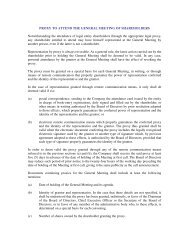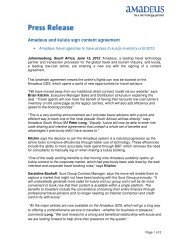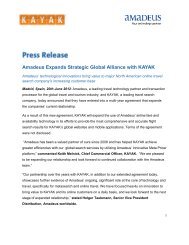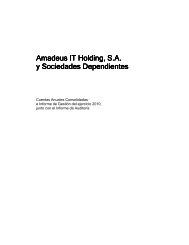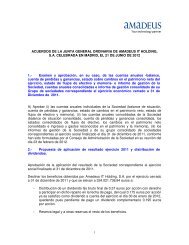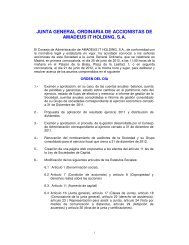Amadeus IT Holding, S.A. and Subsidiaries - Investor relations at ...
Amadeus IT Holding, S.A. and Subsidiaries - Investor relations at ...
Amadeus IT Holding, S.A. and Subsidiaries - Investor relations at ...
You also want an ePaper? Increase the reach of your titles
YUMPU automatically turns print PDFs into web optimized ePapers that Google loves.
Group Group Internal Internal Audit Audit Office<br />
Group Internal Audit Office assists the Audit Committee in its m<strong>and</strong><strong>at</strong>e of monitoring the<br />
effectiveness of the company’s internal control <strong>and</strong> risk management systems.<br />
Chief Chief Financial Financial Officer<br />
Officer<br />
The Chief Financial Officer, as part of the Executive Committee, supports the Audit<br />
Committee by carrying out the following duties rel<strong>at</strong>ed to internal control over financial<br />
reporting:<br />
• Select the accounting policies applicable to the financial inform<strong>at</strong>ion.<br />
• Establish <strong>and</strong> distribute the necessary procedures for internal control over financial<br />
reporting.<br />
• Supervise compliance with the internal control over financial reporting <strong>and</strong> internal<br />
controls <strong>and</strong> procedures for external reporting.<br />
Internal Internal Control Control Unit<br />
Unit<br />
The main responsibilities of the Internal Control Unit, as part of the Finance Function, <strong>and</strong><br />
reporting to the Chief Financial Officer, are:<br />
• Monitor internal control over financial reporting globally.<br />
• Maintain <strong>and</strong> upd<strong>at</strong>e the internal control over financial reporting model with input<br />
from control owners.<br />
• Coordin<strong>at</strong>e control owners on their regular execution of controls.<br />
• Support Group Internal Audit Office on their testing process.<br />
• Follow-up on corrective actions proposed by Group Internal Audit Office.<br />
The Internal Control Unit aims to perform duties which are used to identify, assess, process<br />
<strong>and</strong> record financial <strong>and</strong> non-financial inform<strong>at</strong>ion in a consistent, reliable <strong>and</strong> timely manner<br />
<strong>and</strong> the disclosure of this inform<strong>at</strong>ion.<br />
1.2. The existence of, especially in connection with the financial reporting process, the<br />
following components:<br />
• The departments <strong>and</strong>/or mechanisms are in charge of: (i) the design <strong>and</strong> review of the<br />
organis<strong>at</strong>ional structure; (ii) defining clear lines of responsibility <strong>and</strong> authority, with an<br />
appropri<strong>at</strong>e distribution of tasks <strong>and</strong> functions; <strong>and</strong> (iii) deploying procedures so this<br />
structure is communic<strong>at</strong>ed effectively throughout the company, with particular regard<br />
to the financial reporting process.<br />
• Code of conduct, approving body, dissemin<strong>at</strong>ion <strong>and</strong> instruction, principles <strong>and</strong> values<br />
covered (st<strong>at</strong>ing whether it makes specific reference to record keeping <strong>and</strong> financial<br />
reporting), body in charge of investig<strong>at</strong>ing breaches <strong>and</strong> proposing corrective or<br />
disciplinary action.<br />
• ‘Whistle-blowing’ channel, for the reporting to the audit committee of any irregularities<br />
of a financial or accounting n<strong>at</strong>ure, as well as breaches of the code of conduct <strong>and</strong><br />
malpractice within the organis<strong>at</strong>ion, st<strong>at</strong>ing whether reports made through this<br />
channel are confidential.<br />
• Training <strong>and</strong> refresher courses for personnel involved in preparing <strong>and</strong> reviewing<br />
financial inform<strong>at</strong>ion or evalu<strong>at</strong>ing ICFR, which address, <strong>at</strong> least, accounting rules,<br />
auditing, internal control <strong>and</strong> risk management.<br />
The Board of Directors on a plenary basis is responsible for approving the Company’s<br />
str<strong>at</strong>egy, the organiz<strong>at</strong>ional structure to put the str<strong>at</strong>egy into practice, as well as the<br />
supervision <strong>and</strong> control of the Company’s management for the sake of ensuring th<strong>at</strong> it<br />
complies with the objectives set, <strong>and</strong> respects the corpor<strong>at</strong>e object <strong>and</strong> interest. It is also the<br />
Board of Directors responsibility the appointment <strong>and</strong> eventual removal of the Company’s<br />
Chief Executive Officer (CEO), as well as the appointment <strong>and</strong> eventual removal of the Chief<br />
Financial Officer (CFO), <strong>at</strong> the proposal of the Company’s CEO.<br />
The rest of the senior executive’s appointment, as well as the design <strong>and</strong> review of the<br />
organiz<strong>at</strong>ional structure, is a responsibility th<strong>at</strong> falls on the Company’s CEO. The CEO<br />
alloc<strong>at</strong>es tasks <strong>and</strong> functions, ensuring th<strong>at</strong> duties are adequ<strong>at</strong>ely segreg<strong>at</strong>ed <strong>and</strong> th<strong>at</strong> all<br />
areas within the different departments are coordin<strong>at</strong>ed to be fully aligned behind the same<br />
goals.<br />
2





